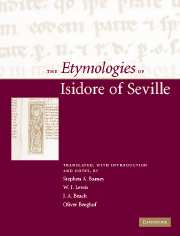Book contents
- Frontmatter
- Contents
- Acknowledgements
- Note to the Reader
- INTRODUCTION
- THE ETYMOLOGIES
- Analytical table of contents
- Book I Grammar (De grammatica)
- Book II Rhetoric and dialectic (De rhetorica et dialectica)
- Book III Mathematics (De mathematica)
- Book IV Medicine (De medicina)
- Book V Laws and times (De legibus et temporibus)
- Book VI Books and ecclesiastical offices (De libris et officiis ecclesiasticis)
- Book VII God, angels, and saints (De deo, angelis et sanctis)
- Book VIII The church and sects (De ecclesia et sectis)
- Book IX Languages, nations, reigns, the military, citizens, family relationships (De linguis, gentibus, regnis, militia, civibus, affinitatibus)
- Book X Vocabulary (De vocabulis)
- Book XI The human being and portents (De homine et portentis)
- Book XII Animals (De animalibus)
- Book XIII The cosmos and its parts (De mundo et partibus)
- Book XIV The earth and its parts (De terra et partibus)
- Book XV Buildings and fields (De aedificiis et agris)
- Book XVI Stones and metals (De lapidibus et metallis)
- Book XVII Rural matters (De rebus rusticis)
- Book XVIII War and games (De bello et ludis)
- Book XIX Ships, buildings, and clothing (De navibus aedificiis et vestibus)
- Book XX (Provisions and various implements)
- APPENDIX Correspondence of Isidore and Braulio
- INDEX
Book XVI - Stones and metals (De lapidibus et metallis)
Published online by Cambridge University Press: 22 September 2009
- Frontmatter
- Contents
- Acknowledgements
- Note to the Reader
- INTRODUCTION
- THE ETYMOLOGIES
- Analytical table of contents
- Book I Grammar (De grammatica)
- Book II Rhetoric and dialectic (De rhetorica et dialectica)
- Book III Mathematics (De mathematica)
- Book IV Medicine (De medicina)
- Book V Laws and times (De legibus et temporibus)
- Book VI Books and ecclesiastical offices (De libris et officiis ecclesiasticis)
- Book VII God, angels, and saints (De deo, angelis et sanctis)
- Book VIII The church and sects (De ecclesia et sectis)
- Book IX Languages, nations, reigns, the military, citizens, family relationships (De linguis, gentibus, regnis, militia, civibus, affinitatibus)
- Book X Vocabulary (De vocabulis)
- Book XI The human being and portents (De homine et portentis)
- Book XII Animals (De animalibus)
- Book XIII The cosmos and its parts (De mundo et partibus)
- Book XIV The earth and its parts (De terra et partibus)
- Book XV Buildings and fields (De aedificiis et agris)
- Book XVI Stones and metals (De lapidibus et metallis)
- Book XVII Rural matters (De rebus rusticis)
- Book XVIII War and games (De bello et ludis)
- Book XIX Ships, buildings, and clothing (De navibus aedificiis et vestibus)
- Book XX (Provisions and various implements)
- APPENDIX Correspondence of Isidore and Braulio
- INDEX
Summary
i. Dust and dirt clods (De pulveribus et glebis terrae) 1. Dust (pulvis) is so named because it is driven (pellere) by the force (vis) of the wind, for it is carried on the breath of the wind, neither resisting nor able to stay put, as the Prophet says (Psalm 1:4): “Like the dust, which the wind driveth from the face of the earth.” 2. Mud (limus) is so named because it is soft (lenis). Mire (caenum) is a pit of filth. Cinders (cinis) are named from burning (incendium), for that is how they are made. Ashes (favilla), because they are made as a result of fire, for fire is Φῶς. 3. A clod (gleba) because it is a ball (globus), for it is compacted as a clump of dust, and unified into a single ball. Earth, then, that is joined together is a clod, and earth that is separated is dust. 4. Labina is named by derivation from ‘falling’ (labes) because it causes people to fall as they are walking. Some think that filth (lutum) is named using antiphrasis, because it is not clean, for everything that has been washed (lavare, ppl. lotus) is clean. 5. Wallowing-places (volutabrum) are named because swine wallow (volutare) there. ‘Marshy ground’ (uligo) is a muck consisting of mud and water. Sabulum (i.e. a small coarse sand) is the lightest type of earth.
6. ‘White clay’ (argilla) is named from the Argives, who were the first to make vases from it. ‘Cretan earth’ (Creta, i.e. white potter's clay) is named from Crete, where the better sort is found.
- Type
- Chapter
- Information
- The Etymologies of Isidore of Seville , pp. 317 - 336Publisher: Cambridge University PressPrint publication year: 2006

